Sometimes the stars align. As it turned out, one of the modules of the SFU writing course I’m taking asked for a nonfiction piece based on an interview. I didn’t have to wonder about this; I knew the interview I wanted (needed) to do.
Just a note regarding language: throughout this piece I use gender neutral pronouns. That is, I use them, their, they in reference, and in deference, to a single person—Teryl. I hope the mental bumps you encounter reading this will not overwhelm. As a point of fact, using their to refer to a single person has over a 600 year history. And of course in certain contexts we do it without thinking, as in: Someone has lost their phone.
But before getting to the interview, I want to—most profusely—say thank you to Teryl for agreeing to do this.
Always Felt like a Teryl
Big news
An email this past November, subject line: I have some big news!, is how I learned that Teryl would be starting hormone replacement therapy (HTR). I wasn’t prepared. In fact, as much as I view myself as progressive, accepting, I wasn’t prepared for what I can only describe as a rush of sadness.
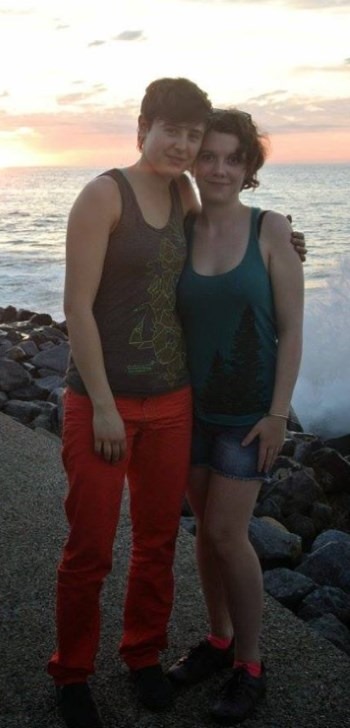 Now, understand that Teryl has presented as genderqueer for the past five years, too, they are in a lovely relationship with a cis female, all of which I’m quite comfortable with—so why so strong a reaction?
Now, understand that Teryl has presented as genderqueer for the past five years, too, they are in a lovely relationship with a cis female, all of which I’m quite comfortable with—so why so strong a reaction?
“I have been thinking about this for a long time,” says Teryl, “I’ve tried to give myself lots of time to present as more masculine without transitioning.”
For the past few years Teryl has used a binder, has dressed in androgynous clothes, and has worn their hair short. “Still,” Teryl explains, “too often I’m misgendered as female…and it’s very jarring.”
I ask when the jarring feeling began. “I can’t trace it all, but I remember as a kid I felt upset and confused about gender stuff. I was okay being differentiated from my brothers on a family level but out in the wide world I hated it. Being told I was opposite to them really bothered me. Being called a girl felt wrong—being called a tomboy felt good.”
I always knew there was a tomboy in Teryl—and I liked that. They were always up for a hike, birding down at the lake, canoeing or camping. I had this wonderful combination of daughter and outdoor/nature companion.
“You didn’t know, but I was gendered as a boy quite a lot. It only bothered me if someone I knew was with me because I felt their discomfort so clearly. But when I was alone and someone said “he”, it felt good. The worst though,” Teryl pauses, shifts in their chair, “was other people saying, is that a boy or a girl?, as if I wasn’t a person. I felt in between and I looked it; I just wanted that to be normal, for people to accept it.”
Gender dysphoria
We’re sitting in Nosh Café, an Indian Restaurant in Edmonton, I’m recording Teryl on my phone. It’s noisy and we lean in: Teryl’s eyes shine like always—an honest, sensitive, keen intelligence. Their face once again confirms that beautiful indelible image I carry. I see too, the scar at the base of their skull, and remember the surgery early in the year that we desperately hoped would abate the chronic pain they live with. (Teryl has lived with nerve pain for much of their life, and while this is tangential to the issue of gender, Deb (Teryl’s mom) and I worried about HRT, as it would be one more medical treatment on top of the already overwhelming number of treatments they have undergone. And yet, as Teryl pointed out, there was also a chance that HRT could ameliorate some of the pain.)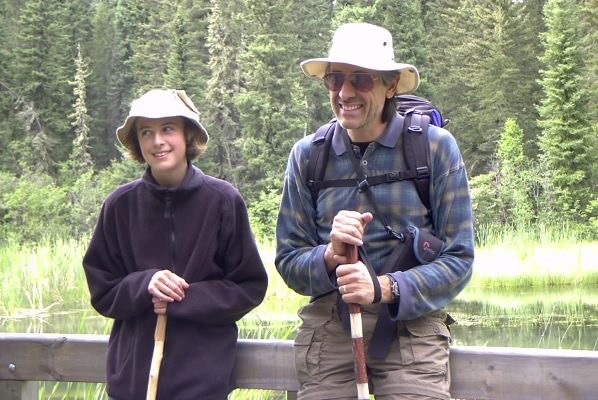
Teryl is telling me of the episodes of dissociation; those moments their body feels misaligned with their inner experience. Gender dysphoria is the formal term: “It’s like not being able to connect with the world through my body…it has nothing to do with hating my body, just not feeling at home in it, which makes me really sad because I like my body and I wish it could sync up better with my mind. Really, that’s what transitioning is all about.”
I’m curious and ask about Teryl’s very first memory of gender dysphoria. “I was five or six, and I took Michael and Lucas (Teryl’s two oldest brothers, teenagers at the time) to a class of show and tell, I told the class about all their sports exploits and how I would be just like them when I grew up…and later my teacher asked what I meant by I’ll be just like them. And it hit me, Oh I’m not going to grow to be like them, I mean, masculine, and I had…like this weird out-of-body experience.”
We talk about growing up in a small town (Stony Plain, AB): “The church, the school I went to, never had the language for any of this, so I stayed quiet.” I say something about this being fortunate, in the sense of avoiding probable schoolyard bullying and banishing. Teryl agrees, “But the other part is that I felt trapped…felt as though I was acting, and I hated that.”
“During university I made a concerted effort of presenting female, it was easy of course, but emotionally,” Teryl looks away, gazes out over 124th Street, “it was one of my lowest points.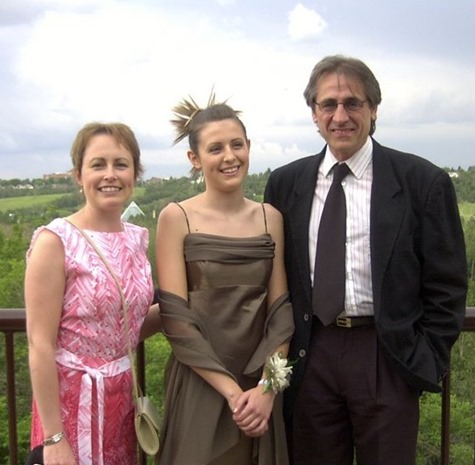
“I’ve agonized all this for so many years. I know we are not just our bodies, we are all much more than our bodies, but it’s with our bodies that we meet the world.” Teryl’s eyes search me, “You know, the most spiritual experiences I’ve ever had is when I’m most able to be inside my body, most able to be physically present in my body.
“So yeah, it’s not a spontaneous decision. It’s been on my mind ever since I figured out that genderqueer/trans was a thing—like 5 years or so. Even after deciding, there’s ample time to think about what this means and what the risks vs benefits are. It took a year just to get in to see Dr. Petryk, one of the two “gatekeepers” in the province for trans medical stuff.”
Teryl finally saw him for the first time last winter. There were several appointments after which he referred them to an endocrinologist. There were no major hurtles. “I only fully decided to transition last October (2016) and it was such a beautiful, life-affirming, and grounding experience, like taking a deep breath or balancing in a (yoga) tree pose. That was my initial internal experience. Everything after that has been a mixed bag, sometimes it seems there’s perils at every turn; and yet at the same time…” Teryl straightens, smiles so the right side of their mouth lifts to reveal the subtle dimple, tilts head—a mannerism I know by heart—“…there’s such a clear path ahead that I still have that feeling of being centred. I am incredibly excited to have begun the process, finally.”
Teryl is into the third week of treatment. They are keeping a weekly vlog on Youtube of their journey. I watch—emotions mixed. I ask about the vlog: “It’s not about being an activist or about carrying a torch for the genderqueer community, I simply hope sharing my lived experience as well as my gender expression will be healing for some, informative for others, and supportive for the genderqueer/trans and wider community.”
They, their, them
While I had accepted Teryl’s identity as genderqueer, I have, admittedly, struggled with Teryl’s preferred pronouns, they, their, them.
“Neither you nor mom have been very good with actually using my preferred pronouns…”
Teryl is right, mostly. “Actually your mom has been much better than me at this. Yes, we both stumble, but we do practice—whether you’re present or not. But consider—your mom said this the other day—we practice with our conscious minds, but our unconscious minds have had 25 years of using gendered pronouns. It’s so easy, especially when tired or distracted or in a hurry, to slip into that old binary default.”
“I get it, and I appreciate you trying…I appreciate how much you’ve tried to refer to me as your second youngest or offspring, or use my name. Even so, beyond the pronouns, I sense a gap of understanding, a certain recalcitrance, reluctance, that’s been difficult, painful for me. If you had done more research into genderqueer and trans identities perhaps you’d be further along in understanding.”
I concede the point. Teryl is touching on a personal trait: I avoid emotional discomfort and I procrastinate doing the necessary work. Still, I find myself thinking (justifying?), this has been a special kind of discomfort.
“You seem okay to embrace the idea of gender as a construct, as spectrum, but at the end of the day I think you still see me as female. It comes across as false to say that you’re okay with me not being a feminine form of Teryl. That’s not all your fault—it’s not about judging—but it still hurts.”
Double bind?
What popped into my head at this point was the first line from a Philip Larkin poem, “They fuck you up, your mum and dad.” For as much as I could never, would never, reject Teryl, never attempt to stop them from following the journey they’re on—need to be on to become the person they feel destined to be, they were right—deep down, beneath my conscious desire to accept the path Teryl is on, I still harboured the longing of being the father of a “daughter.” What is that? An accepting rejection, a rejecting acceptance? Whatever it is, I needed to coax it out, own it.
“Teryl, your journey is your journey, and no one can understand it in the way you understand it, but just now let me share my own grief: I’m thinking of how I felt when you were born, how I delighted in my only daughter. I’m thinking of almost 25 years of family events, stories lived, relived around the kitchen table, a thousand memories, albums full of pictures—all of which you are present as daughter. I’m remembering a picture of you and me dancing at your grad, your shoulder length hair pinned back, dark cinnamon, sleeveless gown, your profile, striking, beautiful, your smile on me, a picture that I had always kept at my desk… I’m sure there will be new pictures, new memories—even better memories coming for you—but let me say that right now, I feel, deeply, the loss of what testosterone will take; I will miss how your voice sounds, I will miss the features you hope to change.”
“If it feels like a loss,” said Teryl, “then it is a loss and it’s okay and important to grieve and feel that. But dad, it’s not a loss for me, it’s an opportunity to feel more like myself, and to express that.”
Their voice is compassionate yet resolved: “As much as I have been trying to find peace in my body and my presentation—and I have to a large degree, so much more than I ever did before I realized I was trans—I can see that there is a more confident and stable future for me around the corner. You need to know I’m doing better than I have in years, maybe better than ever in terms of my mental health…I hope that buoys you up in some way.”
“Of course it does,” I say. And think how it is that the common lot of a parent is to sink or soar, according to their kids’ wellbeing—a blessing and a hard road. 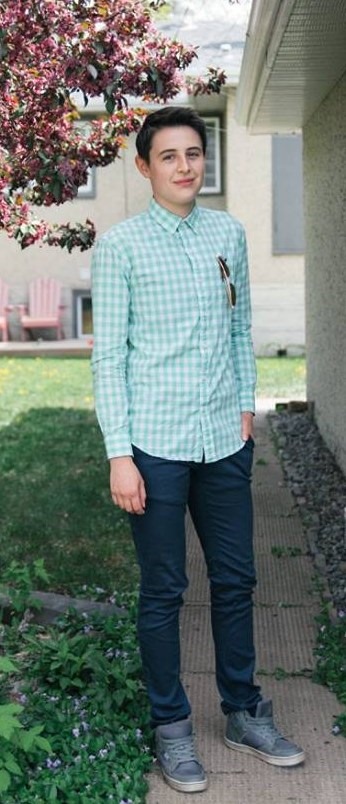
“Well, I feel light and free and excited about moving on with weekly testosterone shots, I know it’s a process, but I think it’ll get easier for you to see that as time goes by.”
Always felt like a Teryl
I ask Teryl how it feels after the first few treatments of “T”. They tell me it changes day by day because it’s still early in the process. “I believe things will level out, become stable with time…I have mostly good days. I’m feeling stronger, happier and more confident than I have in years. Like really truly happy.” Which of course makes me happy. And I say so.
“Dad, you need to understand, my internal world and my personality won’t change, I’m always going to have a more “feminine” personality…if I was to label it on the masculine to feminine spectrum. Rae (Teryl’s partner) and mom and many women I know have a much more “masculine” personality than I ever will. It’s simply that my natural state feels masculine in presentation…not in terms of disposition or personality, just in my body and appearance…so you’re not losing me, I’m still Teryl—I’ve always felt like a Teryl! On that note, I’m happy you and mom gave me a birth name that is gender neutral.”
I remember the discussion Deb and I had about this. Initially, I wanted to call Teryl, Melissa (a favourite Allman Brothers song). Deb wasn’t partial—at least, not as a first name. However, when we heard the name Teryl, both of us liked the sound and uniqueness of it.
I tell Teryl that, “…yes, I still have misgivings, worries, fears beyond transitioning, concerning your health. But your happiness, your being able to flourish, will always eclipse any of this.”
The truth of this hits me. A truth, I believe, shared by all parents. I go on to tell Teryl that my parental flaws are mine; that self-awareness is tricky, and never thoroughly achieved; that I’m still too tethered to social expectations, cultural dictation, old modes of thinking, and that I only hope for their continued understanding, occasional forgiveness and love.
I ask what I (and others) can do to be supportive. “Asking respectful questions and opening dialogue to foster understanding is a big thing, so thanks for doing this interview! And of course using my preferred pronouns all of the time is so affirming. Other than that I would say loving and trusting me, remembering that I know myself better than anyone else could.”
Maybe trust and love is the key to all this. Hurt and pain comes to every relationship, but it will never destroy a relationship that has at its heart, love and trust.

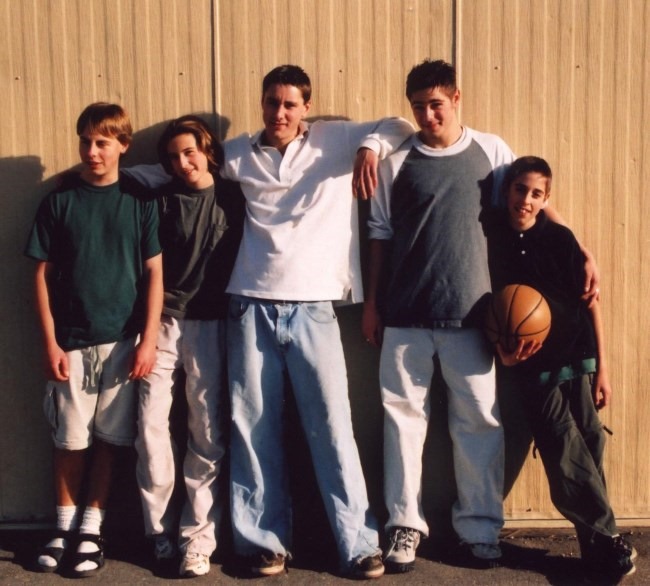
Beautifully written! Thank you for sharing this with the world. This was very enlightening to read. Sending love and hugs to both of you!
Thank you so much Pamela.
Warmly and courageously honest -in public! What better place? Deeply moving!
Thanks to both you and Teryl.
That means a lot Ike. Thank you!
Definitely cried reading this… thank you dad for taking the time to interview me and to actively listen and try and understand this journey as best you can. I love you and mom very much ?
Thank you! Love to you Teryl!
That’s supposed to be a heart in my last comment not a question mark!
I thought so! 🙂
Haha!!! I read it like a question… it sounded funny in my head.
Holding everyone with grace and compassion. Beautifully written. Teryl has amazing parents.
Thank you so much Debi! That’s a gift.
Really helpful for me. I’m so grateful for the vulnerability you both brought to this. What a gift. Thank you.
Thank you Wenda! So encouraging.
Wonderful and informative – thanks for sharing
Thank you Gordon, that means a lot.
I am grateful that you shared your dialogue with Teryl, difficult as it was/is, and so instructive for the rest of us.
Thank you for your kind and encouraging response Millie.
I have too many emotions running through my mind and heart to articulate just how profoundly honest this interview was. Thank you Teryl for being so open to share your journey.
Steve, I wish more people had parents like you and Deb. Even though we (cis people) cannot understand the journey of our trans friends and family, navigating our emotions with love and compassion cannot be understated. One thing I have learned as my partner is transitioning is that mourning the memories of them does not make you unsupportive. That was a hard realization I had to admit – mourning certain traits of TJ doesn’t mean I don’t celebrate who they are.
I wish all parents of trans/genderqueer/nonbinary people could read this.
Much love!
Janelle, your response warms my heart and soul. And I so appreciate your very personal perspective. Thank you, thank you!
Steve, thank you and Deb for sharing this experience with Teryl with love and compassion.
Thank you so much Darci.
So lovely. Thank you, Stephen. I wish Teryl all the best and hope they continue to always feel like a Teryl.
Thank you Laurie! Thank you for your support and kindness.
Steve – this is a beautiful read. Thank you for sharing your struggle, not just your victory.
This paragraph hit me …
“The truth of this hits me. A truth, I believe, shared by all parents. I go on to tell Teryl that my parental flaws are mine; that self-awareness is tricky, and never thoroughly achieved; that I’m still too tethered to social expectations, cultural dictation, old modes of thinking, and that I only hope for their continued understanding, occasional forgiveness and love.”
I think this applies to any parent, and any person, wanting the best for another human being and not being able to fully understand that our ‘best’ does not always equal theirs. Certainly something I’m struggling with as a dad these days.
Dave, thank you for your attentive reading. And thank you for your open, honest, and insightful response. We never stop being parents, and so, I guess, we never stop wrestling.
Steve, what a profound reflection. The statement that caught my attention was when they (I’m trying here:)) said, “I feel like Teryl.” I look forward to continued conversations about politics, ecology, and other issues about which they have felt passionately. Blessings on your whole family through the transitioning.
Thank you very much Sam!
Am entry for the whole world, el mundo entero… Poignant, insightful, tender, and compelling. T. Truth-talk. Thank you – both, all – for sharing this …
Thank you adela! That means a lot.
Thank you to both Stephen and Teryl. What a beautiful and candid conversation. And are you both always this well-spoken? Some families just have these super-human gene pools 🙂 I will be sharing this with dear friends on similar journeys and am very grateful to have read it this evening.
Thank you so much Jennie! I’m far more articulate on paper, where I can leave out all my stammerings. So grateful you dropped by to read this. Thank you again.